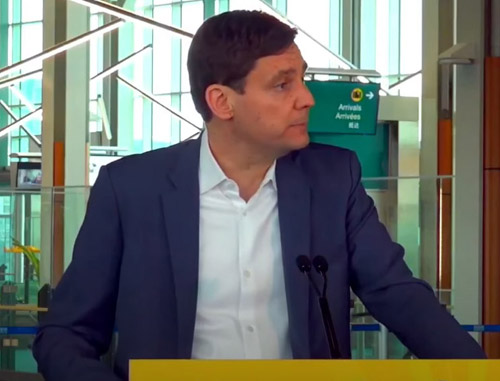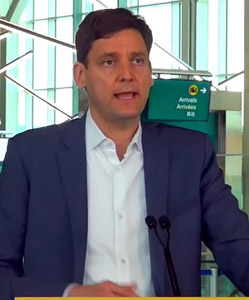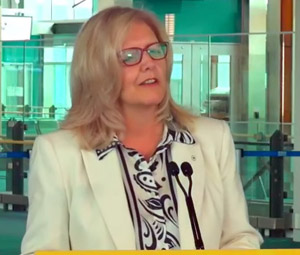Thursday March 21, 2024 | VANCOUVER, BC
by Mary P Brooke | Island Social Trends
The importance of the aviation sector will continue to grow in BC, says Premier Eby emphasizing: “Low carbon needs to be the future of air travel.” Goals including seeing that all BC airports be net zero by 2030, and use of sustainable fuel made-in-BC to be used at BC airports.
YVR (Vancouver), YLW (Kelowna) and YYJ (Victoria) are the three largest airports in BC.
A partnership aimed at fighting pollution in the aviation sector, growing investment and supporting clean, sustainable jobs and business opportunities for people in British Columbia has been made between the B.C. government and Vancouver International Airport (YVR).
Joining Premier Eby to address media today on this announcement held near the Arrivals area of YVR were Brenda Bailey, Minister of Jobs, Economic Development and Innovation and Tamara Vrooman, president and CEO of Vancouver International Airport.
NEWS RELEASE: Province, YVR work together to support good jobs, fight pollution
“Vancouver’s airport is one of our province’s biggest employers and economic drivers of growth and revenue. They’re also leaders in sustainability and innovation,” said Premier David Eby. “By working together on shared priorities, like promoting made-in-B.C. clean tech and expanding trade diversification while reducing pollution, we can maximize benefits for all British Columbians, while strengthening our province’s economic future.”
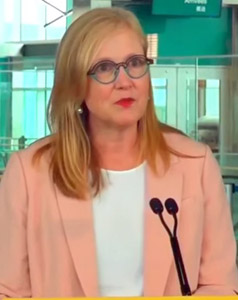
Through a signed memorandum of understanding (MOU), YVR and the Province will collaborate with Indigenous partners, communities and aviation and aerospace stakeholders over three years to deliver new products, projects and activities that reflect the following shared priorities to:
- accelerate sustainable aviation to fight pollution and reduce emissions;
- support community resilience, leveraging YVR’s expertise to support communities in emergency preparedness, response and recovery;
- increase clean-tech investment to promote made-in-B.C. technology and good jobs;
- expand trade diversification, working to meet increased demand for B.C. export and grow B.C. tourism and good jobs for people;
- promote workforce development growth to meet demand for skilled workers in aerospace and aviation; and
- enhance goods and people movement, positioning YVR as a key hub within a multi-modal hub for people and goods movement between communities throughout B.C.
“YVR has long been an economic engine and jobs creator for British Columbia. This partnership recognizes the importance of aviation to the diversification of the provincial economy including zero-carbon innovation, technology, international trade and investment, and skills training,” said Tamara Vrooman, president and CEO, Vancouver International Airport.
“Together with the Government of British Columbia, we are advancing important work and creating value for all British Columbians by strengthening connections between businesses, communities and sustainable economic opportunities,” said Vrooman.
The Province and YVR recognize the benefits of working together to attract clean investment and human capital and to drive sustained economic growth leveraging B.C. StrongerBC economic plan and CleanBC climate plan and YVR as a vital economic asset and crucial driver of B.C.’s economy.
“Creating a dynamic marketplace for sustainable made-in-B.C. technologies aligns with work already being done through the Integrated Marketplace program with YVR,” said Brenda Bailey, Minister of Jobs, Economic Development and Innovation. “I look forward to building on the work already underway and furthering our efforts toward realizing a clean economy.”
As Canada’s second busiest airport, YVR is an economic engine for B.C., connecting people, communities, cargo and markets to the world. This is done through international and domestic services, regional and coastal air services, float planes, helicopter operations, corporate charters, sport fishing camps and aerospace facilities, which connect First Nations and communities throughout B.C., support the delivery of vital services, and facilitate business and economic growth in the province.
To kick off this partnership with YVR, the Province is investing in three key projects that will support the broader aviation industry:
- $250,000 for a sustainable aviation fuel opportunities study to accelerate the development of sustainable aviation fuels and clean technologies (Ministry of Energy, Mines and Low Carbon Innovation);
- $375,000 to support the creation of a net-zero airports action plan to outline actions for carbon-reduction measures across the B.C. airport network in line with CleanBC objectives (Ministry of Transportation and Infrastructure); and
- $250,000 for a study to explore opportunities to enhance the movement of people and goods between YVR, Vancouver Island and beyond, to facilitate multi-modal access to new markets and increase the resiliency of supply chains (Ministry of Transportation and Infrastructure).
The MOU will also help enhance access to reliable, sustainable air services. This is vital to Indigenous communities as it ensures access to critical health and emergency services, supports job creation, creates business and tourism opportunities, and maintains their connection to other parts of the province.
“The B.C. Aviation Council applauds Premier Eby and the Government of British Columbia for this strategic initiative in partnership with YVR and B.C.’s aviation and aerospace industry,” said Heather J. McCarley, board chair, British Columbia Aviation Council. “Aviation is a powerful economic generator connecting communities, people and businesses across our province, and facilitates response for medevacs, wildfires, and other emergencies. The long-term sustainability of our industry, both environmental and financial, is vital for the well-being of our province.”
Establishing BC as a leader in sustainable aviation, clean-technology investment, and building resilient communities aligns with the key objectives of the StrongerBC Economic Plan.
“To create a more sustainable future, we must continue to prioritize the development of clean fuels and low-carbon technology. By working together with partners like YVR, we pave the way for a future where progress and environmental responsibility go hand in hand, ensuring that B.C. has a thriving, clean economy that works for everyone,” said Josie Osborne, Minister of Energy, Mines and Low Carbon Innovation.
“Clean and efficient movement of goods and people across all modes of transport supports healthy communities and a thriving economy. The partnership between the Province and YVR will lay the groundwork for common sense solutions, and builds on the work our government is doing to improve goods and people movement across British Columbia,” said Rob Fleming, Minister of Transportation and Infrastructure, in today’s news release.
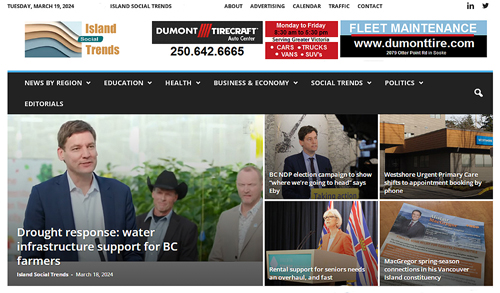
===== ABOUT THE WRITER:
Island Social Trends Editor Mary P Brooke has been following BC politics through a socioeconomic lens since 2014, focussing on education and municipal issues 2014-2018, broader issues during 2018-2019, and covering the COVID pandemic daily during 2020-2022. She now reports with the BC Legislative Press Gallery.
Her series of publications on south Vancouver Island since 2008 are in the permanent archives at the Sooke Region Museum: MapleLine Magazine (2008-2010), Sooke Voice News (2011-2013), West Shore Voice News (2014-2020), and Island Social Trends (2020 to present).
===== SUBSCRIBE TO THE PREMIUM PDF:
To help support professional independent journalism we invite you to subscribe to our biweekly Premium news stream. Receive a PDF of the biweekly print edition, and any current political analysis by email. Individual and small-team rates.


